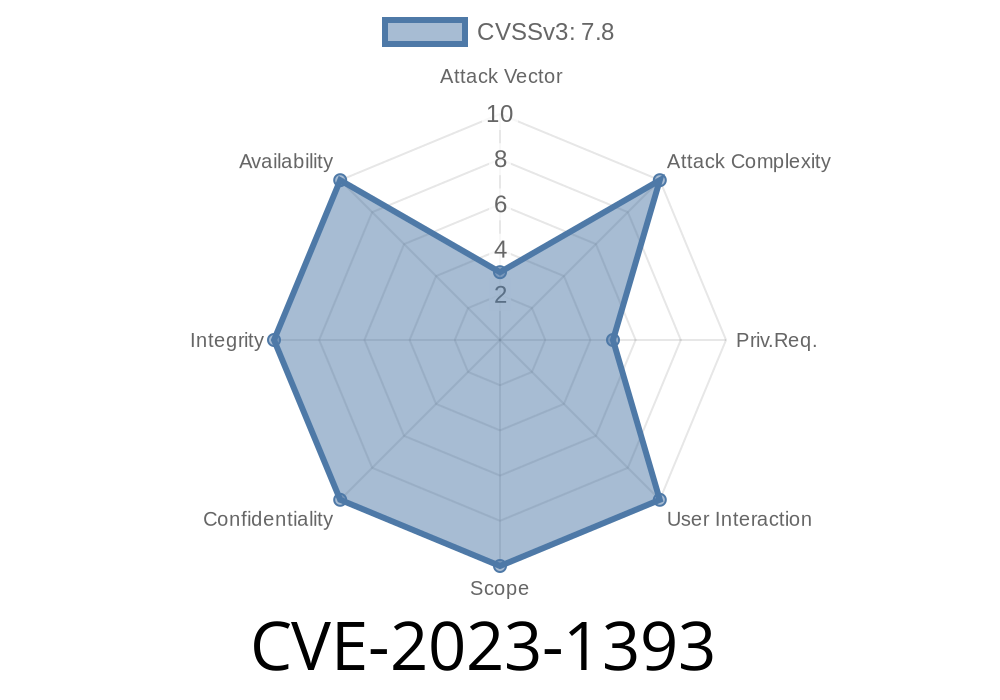A serious security flaw, tracked as CVE-2023-1393, was recently discovered in the X.Org Server Overlay Window (COW) handling. This bug makes it possible for local attackers to exploit a *use-after-free* vulnerability, which can potentially escalate their privileges on a vulnerable system. In this post, we’ll break down how the bug works, why it matters, and how it can be exploited— all in straightforward language for anyone interested in Linux desktop security or X server internals.
What is CVE-2023-1393?
CVE-2023-1393 is a vulnerability in the X.Org X server, specifically in how it manages “compositor overlay windows” (COWs). When a client program explicitly destroys a COW, the server fails to remove a pointer to this now-non-existent window from its internal CompScreen structure. Any future attempts to use this pointer cause a use-after-free (UAF): the server's code tries to access a resource that's already been freed. Attackers can take advantage of this programming error to hijack control within the X server process.
Why does it matter?
- X Server runs with elevated privileges on many systems, including popular Linux desktops (like Ubuntu, Fedora, Debian, etc.).
- Local users can exploit this bug to gain higher privileges— even root access in some configurations.
Here’s a simplified explanation of the problem
1. Background: The X.Org server allows “compositor overlay windows,” used by modern desktops and compositors to provide effects like transparency.
2. Vulnerability: If a client program explicitly destroys its overlay window, the X server leaves a “dangling pointer” to the destroyed object in the CompScreen struct.
3. Triggering the UAF: When the X server later tries to access the same pointer, it could actually be pointing to some other memory location, set up by the attacker via heap manipulation (aka heap feng Shui).
Here’s a simplified version (adapted from the patch and references) showing the bug
// In compFreeOverlayWindow()
void compFreeOverlayWindow(CompScreen *s) {
if (s->pOverlayWin) {
DestroyWindow(s->pOverlayWin); // Frees overlay window
// BUG: s->pOverlayWin is not cleared!
}
// ... later code might use s->pOverlayWin ...
}
After DestroyWindow(s->pOverlayWin);, the pointer still points to a freed object. Later, if code tries to access s->pOverlayWin, BOOM: use-after-free.
Fixed version
void compFreeOverlayWindow(CompScreen *s) {
if (s->pOverlayWin) {
DestroyWindow(s->pOverlayWin);
s->pOverlayWin = NULL; // The fix: remove the dangling pointer
}
}
Exploitation: How Attackers Can Use This Flaw
While a full working exploit requires careful heap manipulation and timing, here’s a high-level idea for how an attacker might abuse CVE-2023-1393:
1. Spawn a malicious X client that creates a compositor overlay window, then destroys it explicitly.
Bring the heap into a desired state (using common heap exploitation techniques).
3. Cause the X server to access the dangling pointer (e.g., by reopening windows, triggering compositor actions, etc.).
4. Gain code execution inside the X server process, which can run as root or with elevated privileges.
Here’s a pseudo-code PoC highlighting the use-after-free trigger
# This requires access to an X session and Xlib or XCB programming.
# Pseudocode only!
import xlib
dpy = xlib.Display()
cow = dpy.create_overlay_window()
# Do something, then destroy the COW explicitly.
dpy.destroy_window(cow)
# Heap manipulation or allocation of new windows to fill freed memory
for i in range(100):
dpy.create_window()
# Attempt to trigger the UAF by performing actions that use CompScreen.pOverlayWin
# This step is X server version & desktop dependent.
References
- CVE-2023-1393 on NIST NVD
- X.Org Security Advisory
- Debian Security Tracker
- Upstream Fix Commit
- Exploit discussions
1. Update X.Org Server
Ensure you’re running a version that includes the upstream patch. Most major Linux distributions released updates in April/May 2023.
2. Limit Local Account Access
Don’t allow untrusted local users to run arbitrary programs, especially on shared workstations.
3. Harden X Server Usage
On modern Linux, consider *wayland* instead of X11 when possible, as it has a different security model.
Conclusion
CVE-2023-1393 highlights the ongoing risks of use-after-free programming errors in core system components. The affected X.Org code is decades old and runs with high privileges, making such bugs especially dangerous. A single misplaced or uncleared pointer can become a pathway for a full system takeover.
If you run a Linux desktop, make sure your X.Org packages are patched! For more info and technical details, check out the links above.
Timeline
Published on: 03/30/2023 21:15:00 UTC
Last modified on: 04/15/2023 04:16:00 UTC
